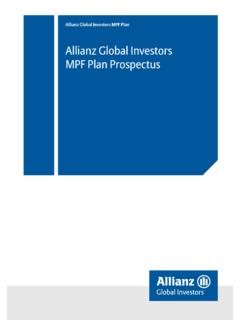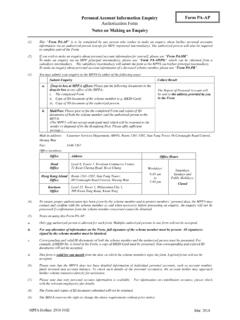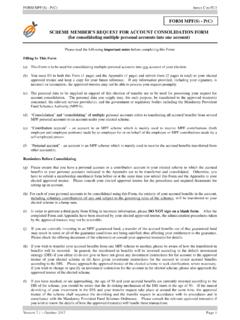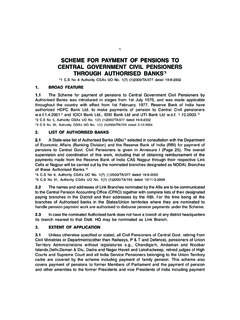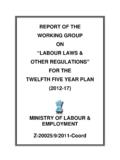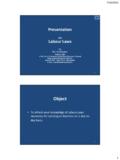Transcription of MANDATORY PROVIDENT FUND SCHEMES …
1 Guidelines Version 2 - July 2008 Page 1 MANDATORY PROVIDENT fund SCHEMES AUTHORITY Guidelines on Relevant Income in Respect of a Relevant Employee INTRODUCTION The MANDATORY PROVIDENT fund SCHEMES (Amendment) Bill 2007 was passed by the Legislative Council on 9 January 2008. The MANDATORY PROVIDENT fund SCHEMES (Amendment) Ordinance 2008 ( Amendment Ordinance 2008 ) was gazetted on 18 January 2008. Part 24 of the Amendment Ordinance 2008, which amends the definition of relevant income in section 2 of the MANDATORY PROVIDENT fund SCHEMES Ordinance ( the Ordinance ), shall come into operation on the day appointed by the Secretary for Financial Services and the Treasury ( 1 November 2008) by notice published in the Gazette. 2. Section 6H of the Ordinance provides that the MANDATORY PROVIDENT fund SCHEMES Authority ( the Authority ) may issue guidelines for the guidance of approved trustees, service providers and other persons concerned with the Ordinance.
2 3. The Authority hereby issues guidelines on determination of relevant income of a relevant employee. EFFECTIVE DATE 4. These revised Guidelines (Version 2 July 2008) shall become effective on the date of commencement of operation of Part 24 of the Amendment Ordinance 2008 ( 1 November 2008) and are applicable to contribution periods beginning on or after that date of commencement. The previous version Guidelines Version 2 - July 2008 Page 2 of these Guidelines (July 2000) shall be superseded on that day. RELEVANT INCOME Definition 5. Section 2 of the Ordinance sets out the definition of relevant income in respect of a relevant employee. 6. Relevant income , in respect of a relevant employee, is defined in section 2 of the Ordinance to mean any wages, salary, leave pay, fee, commission, bonus, gratuity , perquisite or allowance, expressed in monetary terms, paid or payable by an employer (directly or indirectly) to that relevant employee in consideration of his employment under that contract, but does not include severance payments or long service payments under the Employment Ordinance (Cap.)
3 57). Basic Principles 7. An item is not a relevant income if it is a severance payment or long service payment. 8. A relevant income item must fulfill all of the following criteria: (a) being wages, salary, leave pay, fee, commission, bonus, gratuity , perquisite or allowance; (b) being expressed in monetary terms; (c) being paid or payable by the employer (directly or indirectly) to the relevant employee; and (d) being in consideration of the employee s employment under that contract. Each of these criteria is discussed below. Guidelines Version 2 - July 2008 Page 3 9. Relevant income of a relevant employee is to be calculated on a per employment basis. If a relevant employee holds more than one employment, then the employer of each of his employment is required to enrol him in a registered scheme and make MANDATORY contributions for him in respect of the employment contract concerned.
4 Criteria set out in Paragraph 8 Wages, Salary, Leave pay, Fee, Commission, Bonus, gratuity , Perquisite or Allowance 10. Items mentioned above are expected to cover the most common form of emoluments given to a relevant employee. Any loan or advance of money made to a relevant employee should not be included as part of the relevant income of the employee, but if the loan or advance of money is subsequently released in consideration of his employment, such amount should be included as relevant income in the contribution period in which it is released. 11. If a payment is made by an employer to a relevant employee on a significant personal event such as on the employee s marriage, it is generally not included as relevant income since it is not considered as falling within any of the categories of wages, salary, leave pay, fee, commission, bonus, gratuity , perquisite or allowance.
5 For an award determined by a court or tribunal representing wages, salary, leave pay, fee, commission, bonus, gratuity , perquisite or allowance , it should be included as relevant income. 12. If a payment is made to a relevant employee as reimbursement for the expenses which are necessary in the performance of an employment duty incurred by that employee, this payment does not fall within any of wages, Guidelines Version 2 - July 2008 Page 4 salary, leave pay, fee, commission, bonus, gratuity , perquisite or allowance and hence should not be included as relevant income of the employee. Examples of such expenses are entertainment expenses, uniform laundry expenses, mobile phone service charge expenses and mileage duty expenses. Expressed in Monetary Terms 13.
6 Benefits may be provided to a relevant employee either in the form of cash or in the form of goods or services. Non-monetary benefits (such as meals, uniforms, travelling, medical service, life insurance, furniture or education) should not be included as relevant income as they are not expressed in monetary terms. Paid or Payable 14. Income which is paid refers to an actual payment. Income which is payable refers to monies that have fallen due for payment at a certain time (even if they are not paid until a later time). Legally, relevant income does not become payable to a relevant employee until the amount of income is ascertainable and the payment becomes due in accordance with the contract of employment as expressly agreed between the employer and the employee or as implied from the circumstances of the employment.
7 For example, contract gratuities are not usually payable to a relevant employee until the employee s satisfactory completion of the employment contract. Another typical example is that employers of restaurants may pay the service charges collected from customers to their relevant employees in the month following the month in which the service charges are received. This is done because the amount of service charges to be shared amongst the relevant employees for a particular month cannot be ascertained until after the end of that month. The practice between the employers and the employees (payment of service charges in the following month) Guidelines Version 2 - July 2008 Page 5 becomes an implied term in the employment contract of each relevant employee. As a result, the service charges do not become payable to the employee until the following month after the service charges are received and are not relevant income until that (the following) month.
8 15. Back payments ( payments relating to an earlier period perhaps arising from a salary adjustment or a time lag between the ascertainment and payment of commissions, tips or bonuses) to a relevant employee are not relevant income, in general, until the contribution period in which the back payment is ascertained and paid. 16. Similarly, any payment made to a relevant employee for a period or periods not specifically identifiable should be included as relevant income of the employee for the contribution period in which it is made. 17. If a relevant employee receives payments after the cessation of employment, such income should generally be regarded as relevant income when it is ascertainable and becomes due, provided that the employee is entitled to receive such income under his contract of employment.
9 Contributions should be made to the scheme of which the employee is/had been a member. The approved trustee of that scheme shall hold the money on trust and contact the member or ex-member for advice, if required. 18. Income should be included as relevant income for MANDATORY contribution purposes in the earlier of the contribution period in which it is earned and paid or the contribution period in which it is payable but not both. In case relevant income is paid in a contribution period before the contribution period in which the income is earned, the payment is in fact an advance payment or a loan Guidelines Version 2 - July 2008 Page 6 of future income. The income should be included as relevant income in the contribution period in which it is earned. By the Employer (directly or indirectly) 19.
10 The payment of income by an employer may sometimes be made to a relevant employee by a third party. In such cases, whether such payment should be included as relevant income of the employee would depend on the relationship of that outsider with the employer. If an outsider is an agent of the employer and pays at the direction and on behalf of the employer, then the payment should be included as part of the relevant income of the employee. For example, remuneration of relevant employees of companies in the same group may be paid by a particular company in that group. 20. A payment received by a relevant employee should be excluded as relevant income if the payment is not made by or for the employer or if the amount, timing or method of payment is not under the employer s control. 21. Sometimes, a payment is due by a relevant employee to the employer ( a payment in lieu of notice made by a relevant employee to the employer) or a deduction may be made from the income payable to a relevant employee.





